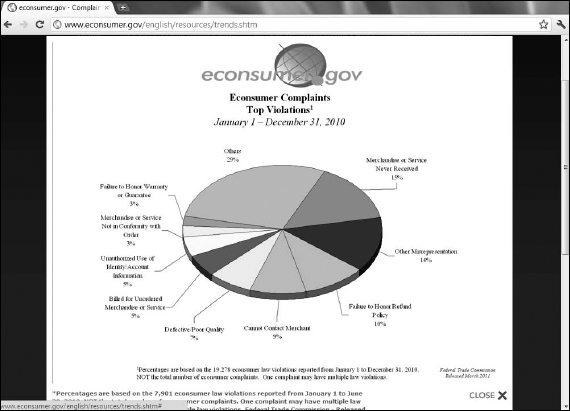Keeping Your Web Site Secure
No matter how much online security and privacy policies are heightened, buyers are still uncertain about their online security and privacy. Research shows that people are still hesitant to give out personal information or credit card numbers to Web sites, even though e-commerce has become increasingly accepted as a viable alternative to storefront shopping. Figure 1-2 shows a snapshot of the top complaints for online shoppers in 2010, according to the Federal Trade Commission (FTC). You probably aren't surprised to see that the figure includes such things as never receiving merchandise, not having refunds honored, and other misrepresentations by the online merchant.

Figure 1-2: Compare reasons for online shopping complaints.
The FTC also keeps track of which online products or industries warrant the most complaints, as shown in Figure 1-3. Such products as clothing, computers, and shop-at-a-home or catalog sales each account for close to 10 percent, but you can see the largest source of complaints (41 percent) falls into the Other category. Although these complaints don't seem to keep everyone from buying, they provide another reason to go out of your way to make your site secure. One of the easiest and, possibly, most expected ways to do this is by using Secure Sockets Layer (SSL) certificates.
Figure 1-3: Compare types of complaints by product or ...
Get Starting an Online Business All-in-One For Dummies®, 3rd Edition now with the O’Reilly learning platform.
O’Reilly members experience books, live events, courses curated by job role, and more from O’Reilly and nearly 200 top publishers.

